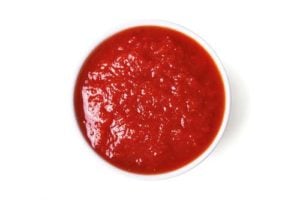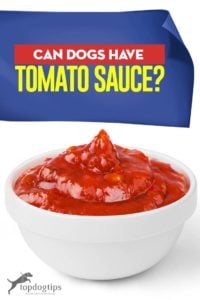There's no reason to ever give a dog tomato sauce, or spaghetti sauce, or ketchup. While in extremely tiny amounts it may be harmless, in larger quantities tomato sauce is harmful to dogs and your pet should not consume it since there are also no benefits to it. Part of this comes from the fact that tomatoes and the green portion of them contains an alkaloid tomatine that's toxic to dogs, and the other part is all the added ingredients in tomato sauce that could have side effects for the animal.
For anybody interested in more details on this, we'll break this down further. It must be stated that tomato sauce often contains onion and garlic, both of which are toxic to dogs and should never be fed to a dog. Pure tomatoes without their skin, or pure tomato paste or sauce that does not contain any additional ingredients, can be fine in small amounts.
When tomatoes are not given to a dog correctly, or if a dog eats an unripe, green tomato, or any other toxic part of a tomato plant, it's likely to cause poisoning. Like anything a dog eats, if for whatever reason you want to feed this food to your pooch, tomatoes must be fed in extreme moderation, and should not be fed to puppies.
 A list of theoretical benefits of dogs eating pure tomato sauce or pure, ripe tomatoes is provided below; however, note that the side effects outweigh the potential benefits and thus there's no reason to give your pooch tomato sauce at all, especially when other food items can provide the exact same nutrition without the dangers of tomato sauce.
A list of theoretical benefits of dogs eating pure tomato sauce or pure, ripe tomatoes is provided below; however, note that the side effects outweigh the potential benefits and thus there's no reason to give your pooch tomato sauce at all, especially when other food items can provide the exact same nutrition without the dangers of tomato sauce.
Following is a list of the side effects that indicate that a dog is allergic to tomatoes, as some dogs do have a tomato allergy. And after that is a list of the side effects that indicate a dog is experiencing tomatine poisoning, most commonly due to eating an unripe tomato, or another toxic part of the tomato plant, which includes the stems, roots, leaves of the tomato plant, or skin of the tomato, all of which a dog should NEVER eat because they contain high levels of a toxic alkaloid called tomatine.
Potential Benefits of Tomato Sauce
Here's a list of nutrients commonly contained in most tomato sauce products that, in theory, could benefit the dog.
Beta-Carotene: This carotenoid improves cognition, which is the ability to think and learn new things and also helps to prevent metabolic syndrome, which is a group of conditions, including high blood pressure, high blood sugar, and excess body fat, that occur together and greatly increase the risk of heart disease, stroke, and diabetes.
Chromium: This mineral is known to enhance the action of insulin in the blood stream, which positively impacts the body’s ability to regulate blood sugar levels, and also aids in the metabolism of protein, fat and carbohydrates.
Fiber: This carbohydrate promotes healthy digestion and regular bowl movements, in addition to helping the body to regulate it’s use of sugar, which aids in keeping hunger and blood sugar levels in check.
Folate: This is one of the B-vitamins that is required for the body to produce red and white blood cells in the bone marrow, as well as convert carbohydrates to energy, and is also needed to produce DNA and RNA within the cells of the body.
Lycopene: This carotenoid reduces the risk of heart disease and stroke, as well as helping to keep bones strong and healthy, in addition to being a cancer prevention aid.
Magnesium: This mineral aids in healthy bones and bone structure within the body.
Potassium: This mineral and electrolyte promotes healthy blood pressure, nerves, and muscles by way of helping muscles to work effectively, including the muscles that control the heart and breathing.
Vitamin A: Promotes good eyesight, a healthy immune system, and cell growth.
Vitamin C: Promotes a healthy immune system and helps to reduce the risk of cardiovascular disease by battling high blood pressure, in addition to being involved in the repair of tissue and enzymatic production of certain neurotransmitters.
Vitamins A and C: Both of these antioxidants work together to maintain healthy skin and support quicker healing of wounds.
Common Questions Related to a Dog Eating Tomatoes
How Many Tomatoes Can a Dog Safely Eat?
On average, one large ripe tomato or two smaller ripe tomatoes given to a dog once per week should be enough for the dog to receive all of the benefits of eating a tomato, without experiencing the negative and potentially harmful side effects that can occur if they eat too much of a good thing.
Can a Dog Eat Cherry Tomatoes?
Yes. As long as the tomato is ripe and red in color. Any type of tomato is okay for a dog to eat as long as it is ripe, red, and the skin has been removed. However, if you feed your dog a larger sized tomato, you will want to feed he or she a bit less of it, in order to equal out to the recommended amount of one average sized tomato per week.
Can a Dog Eat a Tomato that is Green in Color?
No. Dogs can never eat green tomatoes. They contain up to 5 percent tomatine, which is highly toxic to all dogs. If accidental ingestion of a green tomato occurs, the dog must be rushed to an urgent care veterinarian clinic, right away.
Can a Dog Eat a Cooked Tomato or Tomato Sauce?
Cooking a tomato slightly before feeding it to a dog is actually recommended because cooking the tomato allows the dog’s body to absorb the powerful lycopene antioxidant and all of the beneficial nutrients found in the tomato easier than when eating an uncooked, ripe tomato. Make sure that the cooked tomatoes were all ripe and red before cooked and that they do not have any added ingredients, such as salt, garlic, onion, or other spices as these ingredients are toxic to dogs.
What is the Amount of / Daily Value of Nutrients in One Medium Size Tomato? (123 grams)
Fiber: 1.5 grams
Magnesium: 3% of daily value
Potassium: 292 milligrams, 8% of daily value
Sugar: 3.2 grams
Vitamin A: 20% of daily value
Vitamin B6: 6% of daily value
Vitamin C: 28% of daily value
Side Effects of Tomato Sauce for Dogs
Some dogs are allergic to tomatoes. While this allergy is uncommon, it can be serious. Therefore, it is important to observe your dog for a minimum of 30 minutes after feeding he or she a tomato, and watch out for the following side effects and indications of a tomato allergy in your canine companion.
- Diarrhea
- Gas
- Growling Stomach
- Hot Pink or Red Ear Skin
- Itching Skin
- Licking Feet Excessively
- Nausea
- Skin Rashes
- Vomiting
The side effects and indications of a tomato allergy are different than the side effects of tomato poisoning. If your dog eats any toxic or poisonous part of the tomato plant, he or she can become quite ill. Observe your dog for the following side effects of tomatine poisoning, if you suspect that tomatine poisoning has taken place.
The ASPCA (American Society for the Prevention of Animal Cruelty) advises dog owners that these will be the symptoms that can be seen of tomatine poisoning occurs.
 Behavioral Changes
Behavioral Changes- Cardiac Distress
- Convulsions
- Dilated Pupils
- Drooling
- Lethargy
- Loss of Coordination
- Loss of Muscle Control
- Muscle Weakness
- Seizures
- Severe Gastrointestinal Distress
- Tremors
*If your dog displays any one of these symptoms, you should take the dog to a licensed urgent care veterinarian clinic, immediately.
*If you grow tomatoes anywhere on your property, make sure that there is absolutely no way that your dog can get to them.
READ NEXT: What Human Food Can Dogs Eat?













